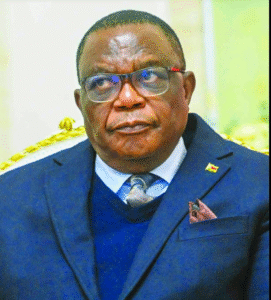MUDENDA GAGS MP OVER MNANGAGWA’S BLUNDER AS ZIMBABWE’S PARLIAMENT LOSES ITS POWER

Speaker of Parliament Jacob Mudenda has once again proven that Zimbabwe’s legislature is no longer a place for serious national debate but a tool to protect President Emmerson Mnangagwa from public scrutiny. This time, it was CCC MP Gladys Hlatywayo who faced the Speaker’s wrath. Her crime? Trying to question Mnangagwa’s reckless and embarrassing comments in Russia, where he labelled Zambia as a client state of the United States.
Mnangagwa’s remarks, made during a meeting with Russian President Vladimir Putin in St. Petersburg, have triggered outrage across the region. Referring to both Zambia and Malawi as “satellite states” of America, Mnangagwa didn’t just embarrass himself—he set fire to already fragile diplomatic relations. Worse still, these statements come just months before Zimbabwe takes over the chairmanship of the Southern African Development Community (SADC).
In any functioning democracy, such a blunder by the Head of State would be debated in parliament. It would be questioned. It would be held to account. But not in Zimbabwe. When Hlatywayo, who is the CCC’s foreign affairs spokesperson, stood up to raise this issue in Parliament, she was immediately silenced by Mudenda. He declared that foreign relations are the sole domain of the executive, denying MPs their right to interrogate a matter of public and regional importance.
This move by Mudenda is not only disturbing—it is unconstitutional.
Zimbabwe’s own constitution makes it clear: the executive is accountable to Parliament. The President is not above the law. He is not above scrutiny. In fact, the constitution says all public officials and institutions must answer to the legislature. Yet in today’s Zimbabwe, even mentioning the President’s name in Parliament brings trouble—especially if you are from the opposition.
Hlatywayo is no stranger to political punishment. Mudenda had already removed her from the African Caribbean Pacific-European Union parliamentary delegation, stripping her of her voice in international forums. Now, her voice is being silenced at home too.
Mudenda’s latest actions are not isolated. He has consistently used his position to protect Zanu PF and punish the opposition. Earlier this year, he rescinded portfolio committee appointments made by the pro-Chamisa faction of the CCC. Then, he blocked the reinstatement of recalled CCC MPs, ignoring international pressure from the Inter-Parliamentary Union.
This is a pattern. It is the steady destruction of Parliament’s independence. What we are seeing is not just partisan politics—it is a complete capture of Parliament by the executive. And as Parliament weakens, so too does Zimbabwe’s democracy.
We are now in a situation where Mnangagwa can insult neighbours, damage regional relations, and still escape all accountability. Zambia has already responded with diplomatic anger. Malawi is watching. SADC is watching. And the people of Zimbabwe are watching too—wondering why their Parliament has become a rubber stamp instead of a watchdog.
This matters because Zimbabwe is about to chair SADC. If we cannot hold our own President accountable at home, how can we lead a regional bloc? How can we demand fairness, dialogue, and democracy from others when we suppress these very things in our own Parliament?
Hlatywayo’s silencing is a warning to all Zimbabweans. It shows how far the rot has gone. It shows that even the constitution can be ignored to protect a President who refuses to admit fault.
This is not just about one comment in Russia. It is about the collapse of constitutional governance. It is about a Parliament that has been hijacked by fear, by partisanship, and by executive overreach. The legislature is no longer a check on power—it is now an extension of it.
But Zimbabweans must not be fooled. The louder the Speaker shouts, the more the people must demand answers. The more Parliament is silenced, the more the people must speak up. Because if Parliament cannot question the President, then who will?
As we approach the SADC summit in August, Zimbabwe has a choice: to continue down the road of silencing and cover-ups or to reclaim its democratic institutions. The world is watching. And so is the region.



